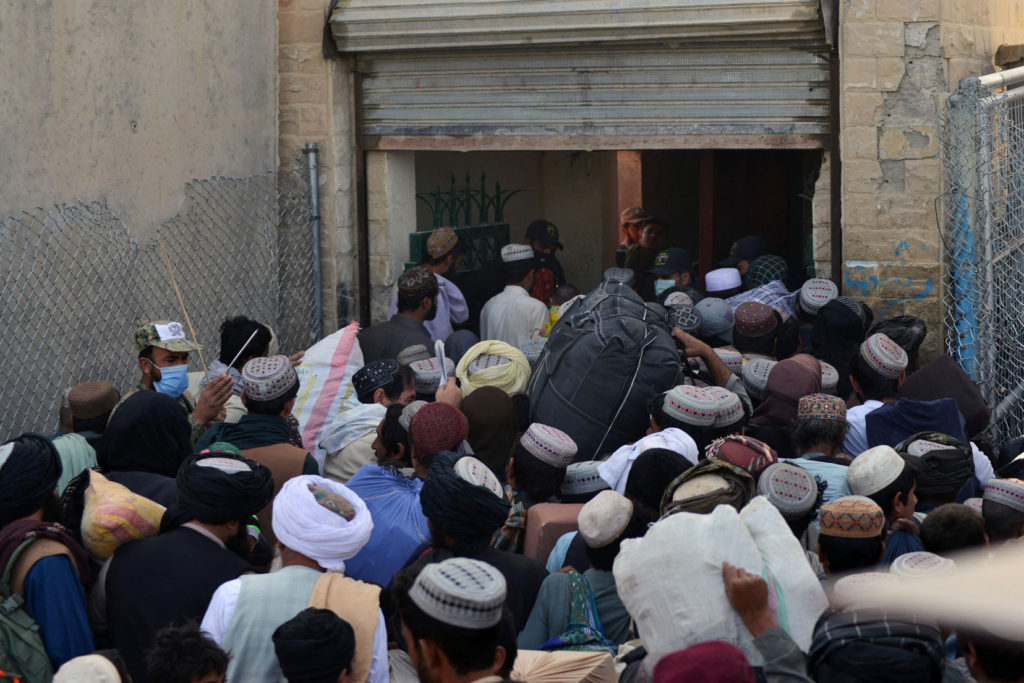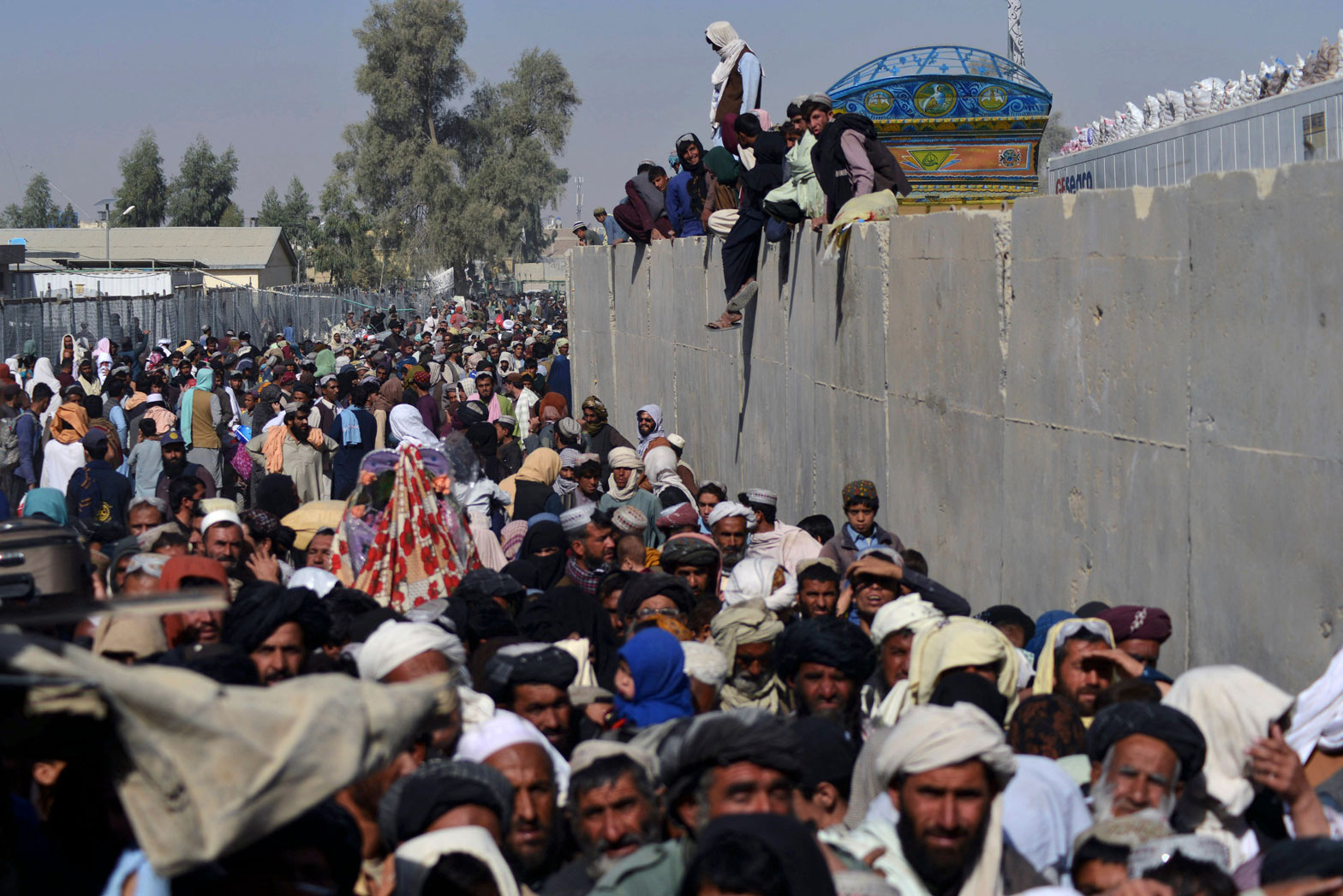For four hours we waited, standing still among the thousands of desperate people trying to cross Afghanistan’s border into Pakistan. All around us we could see the tattered and torn social fabric of our country: mothers clutching crying babies, migrant laborers looking for work, old men leaning on walking sticks, the ill and infirm sitting in wheelchairs.
At 2pm we began to shuffle slowly forwards on the dirt road, our bodies pressed tightly against each other, our feet caked in dust. When the crowd surged and swayed, the Taliban guards lashed out at whoever was within striking distance. They did not discriminate. Some of the guards used cables and hoses to beat people back. Others used their Kalashnikovs as clubs. They tried to shout at us, but their voices were hoarse from exhaustion and their words sounded more like whispers than cries of fury.
It was a Tuesday earlier this fall and I had travelled to the Torkham border crossing with my sister-in-law and five-year-old nephew, hoping to escort them to Islamabad. Although we all had Afghan passports and Pakistan entry visas, we knew the journey would not be straightforward. Tens of thousands of Afghans have left the country since the Taliban’s victory in August, either scrambling onto the last international flights out from Kabul or heading overland to Pakistan and Iran. They have done so out of fear and desperation, rather than hope or expectation. We are not stateless like Palestinians, yet we too feel unwanted by the world.
While I would not be leaving Afghanistan for long, my sister-in-law intended to resettle in Australia, where my brother lives. She had been granted a three month temporary evacuation visa and it was my duty to help her get there safely. I would return to Kabul as soon as she was on a plane to her new life in the West. The situation at the border, however, was worse than anything I had imagined and we soon started to worry that we might not make it through.
We Afghans are used to waiting around because of the incompetence and arrogance of our officials. We are accustomed to being abused and treated as second-class citizens by our own governments. But in all my life I had never seen a hell like this.
Torkham is one of just two official border crossing points from Afghanistan into Pakistan. At the approach to the frontier lone adults were corralled to the right of the dirt road and families, including us, to the left. The Taliban guards were a mixture of Kuchis — Afghan nomads — and local men from Nangarhar. One called me a donkey, another joked that a woman in the crowd was a witch. The guards were clearly inexperienced at their jobs and dealing with a huge mass of tired, frightened people cannot be easy, but manners are highly valued in our culture and their behavior was shocking. Occasionally they would yank someone out, punch and kick them and send them to the back of the line. The moral degradation was contagious.
Throughout that first day there was no solidarity at the border, no sense of shared suffering or Islamic brotherhood. If someone left their place in the queue to look for a modicum of privacy to go to the toilet, their fellow Afghans in the crowd would shun them on their return and refuse to let them back into line. This is what war does to people. We decided it was better to be dehydrated and risk fainting than to lose our place or piss ourselves from drinking too much.
We inched forward until 7pm, when the Taliban told us the border was now closed for the day. We had two choices: leave and join the line from the start the next morning or stay put overnight in the cold, with no shelter, no food and no access to a washroom. In truth, it was no choice at all. We had to stay put or we would never make it across.
As night settled upon us, a fragile calm took hold. Everyone lay in the dirt together, sleeping shoulder to shoulder, trying to conserve their energy so they could continue inching forward in the morning. Even the Taliban took the opportunity to rest. For a few hours the insults and the beatings stopped. Just after midnight, the Taliban announced that the women and children could move forward to a path that veered off to the left from the dirt road, forming a kind of caged passageway that funneled everyone to the crossing point. The passage was paved, fenced on both sides, and covered with a corrugated metal roof. I hoped my sister-in-law and nephew would sleep better there.
The next morning, I rose early and began to edge forwards again — still surrounded by tired, angry people. I was confident I would catch up with my sister-in-law, who was waiting in the fenced passage just a few hundred meters away, by the early afternoon. Then word started to spread that hundreds of the migrants ahead of us had been crossing into Pakistan using fraudulent exit stamps they had obtained in Kabul and Jalalabad. There was commotion as armed troops from the Taliban’s intelligence agency arrived and made several arrests. We were told that no one else would be allowed to cross for the rest of the day. It was pointless arguing.
After again sleeping in the dirt, away from my sister-in-law and nephew, I got ready at the dawn call to prayer and prepared for my third day of queuing. This time I made it down the caged passageway and reunited with my sister-in-law and nephew. Shuffling forward with other families, but hemmed in on both sides by wire fencing, we reached the office that served as passport control, where we were given our exit stamps. Then, as we reached a gate marking the Pakistan border and began to think our nightmare was over, we were told it was locked and we would again have to wait.

Panic began to spread. We were trapped in a cage full of people. Some women and children began to cry. Others shouted for water or pleaded for access to a toilet. Then, just as the sense of despair threatened to become overwhelming, I heard that a number of new Taliban had arrived at the border. Soon, I glimpsed them myself. They wore camouflage jackets and had a more disciplined, professional aura than the guards who had been abusing us. After a while, I was able to talk to some of them. They were from Wardak and had been sent to Torkham by the Taliban leadership to restore order. Around 30 guards had been stationed at the frontier until their arrival. Now there were some 150 of these new Taliban and it was clear they meant business. They told us to stay calm and said we would soon be able to cross into Pakistan.
No one was in the mood to listen, however. People were still surging forward, squeezing us tight until it was difficult to breathe. I hauled my nephew onto my shoulders. The women among us, including my-sister-in-law, pushed hard against the gate until a Talib let them through, before again slamming the gate shut. My nephew was now separated from his mother and started to cry. I passed him to her over the gate, then threw my bag over. When my nephew called out for me, one of the Talibs took pity on us and let me clamber up the fence and climb over the gate. It was around 2pm on a Thursday and we were finally in Pakistan. Two weeks later my sister-in-law boarded her flight to Australia and I began the return journey to Kabul. Getting back into Afghanistan was far easier than leaving.
This “Letter from Kabul” is part of a regular new offering by New Lines. Over coming weeks our contributors will provide their own unique glimpses into life on the ground in Taliban-controlled Afghanistan. Today’s segment looks at the problems faced by Afghans trying to cross the border into Pakistan. Subscribe to our newsletter to receive future editions.



